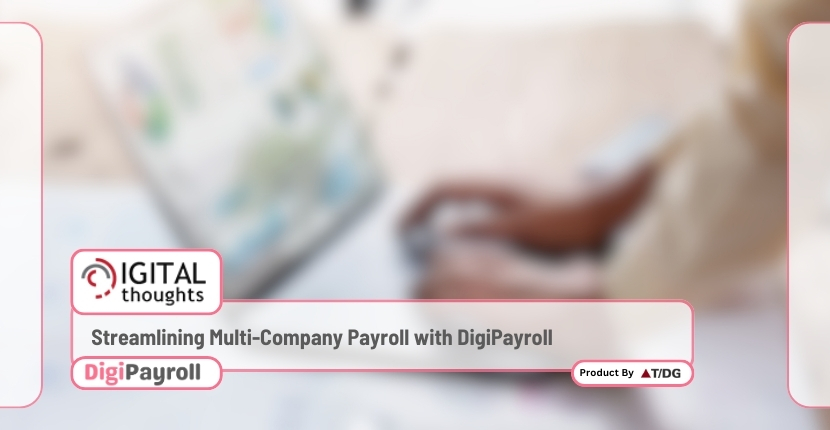Top 5 Challenges in Multi-Company Payroll Processing and How DigiPayroll Addresses Them

Payroll management across multiple companies presents a complex array of challenges that can strain an organization's resources and efficiency. Each company may operate under different jurisdictions, adhere to varying tax laws, and implement distinct payroll policies, making the consolidation of payroll processes a daunting task. The intricacies involved in ensuring compliance with diverse regulatory frameworks, maintaining data accuracy, and managing multiple currencies can lead to significant administrative burdens and potential errors.
DigiPayroll emerges as a comprehensive solution designed to address these multifaceted challenges inherent in multi-company payroll management. By offering a centralized platform, DigiPayroll enables organizations to streamline payroll operations across various entities, ensuring consistency and compliance. Its customizable features allow for the adaptation to specific needs of each company, including the management of different tax regulations, currencies, and payroll schedules. This flexibility not only simplifies the payroll process but also enhances accuracy and efficiency, allowing businesses to focus more on strategic initiatives rather than administrative tasks.
Challenge 1: Compliance with Diverse Tax Laws and Regulations
Payroll management across multiple companies often involves navigating a complex landscape of varying tax laws, labor regulations, and statutory requirements across different jurisdictions. This complexity can lead to significant administrative burdens, increased risk of non-compliance, and potential financial penalties.

DigiPayroll's Solution:
Customizable Settings for Country-Specific Tax Laws and Compliance Requirements:
DigiPayroll offers a highly customizable platform that allows organizations to configure payroll parameters tailored to the specific tax laws and compliance requirements of each country in which they operate. This flexibility ensures that payroll calculations, deductions, and reporting adhere to local regulations, thereby minimizing the risk of non-compliance.
Automated Updates to Ensure Adherence to the Latest Regulatory Changes:
To keep pace with the dynamic nature of tax laws and labor regulations, DigiPayroll provides automated updates that incorporate the latest regulatory changes. This feature ensures that payroll processes remain compliant without the need for manual intervention, reducing the administrative workload and mitigating the risk of errors due to outdated information.
Challenge 2: Ensuring Data Accuracy and Consistency
Payroll management across multiple entities necessitates the maintenance of accurate and consistent data to prevent errors and discrepancies. Inaccurate payroll data can lead to issues such as incorrect employee compensation, tax miscalculations, and non-compliance with regulatory requirements, all of which can have significant financial and legal implications.
DigiPayroll's Solution:
Centralized Database for Uniform Data Management:
DigiPayroll utilizes a centralized database system that consolidates payroll information from all associated companies. This unified approach ensures that data is stored consistently, reducing the likelihood of discrepancies that can arise from disparate data sources. By centralizing payroll data, organizations can maintain uniformity in data management practices across all entities, facilitating easier access, reporting, and oversight.

Real-Time Data Validation to Minimize Errors:
To further enhance data accuracy, DigiPayroll incorporates real-time data validation features during data entry and payroll processing. As information is inputted into the system, validation checks are performed instantaneously to ensure that the data adheres to predefined criteria and standards. This immediate feedback mechanism allows for the correction of errors at the point of entry, significantly reducing the propagation of inaccuracies throughout the payroll system. Implementing real-time validation not only improves data integrity but also streamlines the payroll process by minimizing the need for subsequent data corrections.
Challenge 3: Managing Currency Variations and Exchange Rates
Payroll management across multiple countries introduces the complexity of dealing with various local currencies and the volatility of exchange rates. This complexity can lead to challenges in ensuring accurate compensation, maintaining financial consistency, and adhering to local compliance requirements.
DigiPayroll's Solution:
Support for Multiple Currencies:
DigiPayroll is designed to handle payroll processing in multiple currencies, allowing each subsidiary or branch to operate in its local currency. This feature ensures that employees receive their compensation in the currency they are accustomed to, reducing confusion and enhancing satisfaction. It also simplifies compliance with local financial regulations that may mandate payments in the local currency.

Automated Currency Conversion:
To manage the fluctuations in exchange rates seamlessly, DigiPayroll incorporates automated currency conversion features. The system can be configured to update exchange rates at predefined intervals, ensuring that all currency conversions reflect the most current rates. This automation minimizes the risk of errors associated with manual calculations and ensures consistency in financial reporting across the organization.
Challenge 4: Integrating Payroll with Various Accounting Systems
Aligning payroll data with diverse accounting systems across multiple companies can present significant integration challenges. Each entity may utilize different accounting platforms, leading to potential issues in data synchronization, consistency, and accuracy. These challenges can result in increased administrative workload, data entry errors, and difficulties in financial reporting.
DigiPayroll's Solution:
Flexible Integration Capabilities:
DigiPayroll is designed with flexible integration features that facilitate seamless data transfer between its platform and various accounting systems used by different companies. This adaptability ensures that payroll data is accurately and efficiently synchronized with each company's accounting software, regardless of the specific platform in use. By automating data exchange, DigiPayroll minimizes manual data entry, reduces the risk of errors, and streamlines the overall payroll and accounting process.

Customizable General Ledger Entries:
To accommodate the unique accounting practices of each company, DigiPayroll offers customizable general ledger (GL) entry configurations. This feature allows organizations to define GL mappings that align with their specific chart of accounts and financial reporting requirements. By tailoring GL entries to match individual accounting structures, DigiPayroll ensures that payroll expenses and liabilities are accurately recorded, facilitating precise financial reporting and analysis.
Challenge 5: Generating Comprehensive and Compliant Reports
Producing accurate and compliant payroll management reports for each company within a multi-entity organization is essential for transparency, auditing, and adherence to local regulations. This task becomes increasingly complex when dealing with diverse reporting requirements across various jurisdictions.
DigiPayroll's Solution:
Robust Reporting Payroll System for Tailored Payroll Reports:
DigiPayroll offers a suite of robust reporting payroll system that enable the generation of detailed payroll reports customized to each company's specific requirements. Users can create various reports, such as checks information, year-to-date summaries, and more, ensuring that all necessary payroll data is accurately captured and presented in a format that aligns with the organization's needs.

Automated Generation of Statutory Reports:
To ensure compliance with local authorities, DigiPayroll automates the creation of statutory reports, such as the Employer Monthly Summary (EMS). This feature streamlines the reporting process by automatically compiling and formatting the required data, reducing the risk of errors associated with manual report generation. By keeping abreast of regulatory changes, DigiPayroll ensures that all statutory reports meet current compliance standards, thereby simplifying the auditing process and enhancing transparency.
Conclusion
DigiPayroll addresses these challenges effectively, making it an ideal solution for businesses managing payroll across multiple entities. Its customizable settings accommodate country-specific tax laws and compliance requirements, ensuring adherence to diverse regulations. The centralized database consolidates payroll information for all companies, ensuring uniform data management and real-time data validation to minimize errors.
With support for multiple currencies and automated currency conversion features, DigiPayroll seamlessly manages exchange rate fluctuations. Its flexible integration capabilities allow seamless data transfer between DigiPayroll and various accounting platforms, with customizable general ledger entries to match the specific accounting practices of each company.
Robust reporting payroll system generate detailed payroll reports tailored to each company's requirements, and automated generation of statutory reports ensures compliance with local authorities. By leveraging these features, DigiPayroll streamlines multi-company payroll processing, enhances accuracy, and ensures compliance across diverse jurisdictions. For more more details visit - https://www.thedigitalgroup.com/products/digi-payroll/
